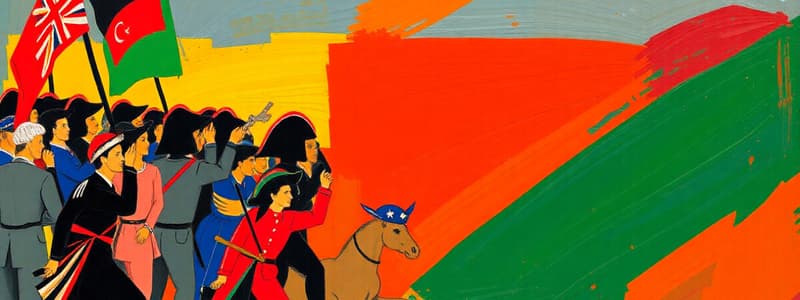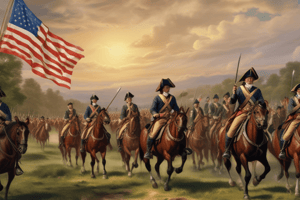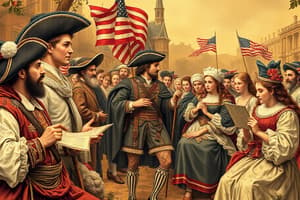Podcast
Questions and Answers
The first permanent English colony in North America, founded in 1607, was _______.
The first permanent English colony in North America, founded in 1607, was _______.
Jamestown
The _______ was signed in 1620 by the Pilgrims to establish self-governance in their colony.
The _______ was signed in 1620 by the Pilgrims to establish self-governance in their colony.
Mayflower Compact
The first legislative assembly in the American colonies, established in Virginia in 1619, was called the _______.
The first legislative assembly in the American colonies, established in Virginia in 1619, was called the _______.
House of Burgesses
The British imposed the _______ in 1765, requiring colonists to buy special stamps for printed materials.
The British imposed the _______ in 1765, requiring colonists to buy special stamps for printed materials.
The _______ of 1773 allowed the British East India Company to sell tea directly to the colonies, leading to the Boston Tea Party.
The _______ of 1773 allowed the British East India Company to sell tea directly to the colonies, leading to the Boston Tea Party.
The first battles of the American Revolution took place in April 1775 at _______ and _______.
The first battles of the American Revolution took place in April 1775 at _______ and _______.
The Continental Congress formally adopted the _______ on July 4, 1776, declaring independence from Britain.
The Continental Congress formally adopted the _______ on July 4, 1776, declaring independence from Britain.
The last major battle of the Revolutionary War occurred at _______ in 1781, resulting in British surrender.
The last major battle of the Revolutionary War occurred at _______ in 1781, resulting in British surrender.
The Treaty of Paris, signed in _______, officially ended the American Revolution and recognized American independence.
The Treaty of Paris, signed in _______, officially ended the American Revolution and recognized American independence.
The first constitution of the United States, which proved to be weak, was called the _______.
The first constitution of the United States, which proved to be weak, was called the _______.
The rebellion led by farmers in 1786-1787 that exposed weaknesses in the Articles of Confederation was called _______.
The rebellion led by farmers in 1786-1787 that exposed weaknesses in the Articles of Confederation was called _______.
The Constitutional Convention met in _______ in 1787 to draft a new governing document.
The Constitutional Convention met in _______ in 1787 to draft a new governing document.
The _______ Compromise created a two-house Congress, balancing representation for large and small states.
The _______ Compromise created a two-house Congress, balancing representation for large and small states.
The _______ Compromise determined that enslaved people would count as three-fifths of a person for taxation and representation.
The _______ Compromise determined that enslaved people would count as three-fifths of a person for taxation and representation.
The first ten amendments to the U.S. Constitution, which protect individual rights, are known as the _______.
The first ten amendments to the U.S. Constitution, which protect individual rights, are known as the _______.
The Federalist Papers were written by _______, _______, and _______ to support the ratification of the Constitution.
The Federalist Papers were written by _______, _______, and _______ to support the ratification of the Constitution.
The idea that government power comes from the people and that they have the right to change it is called _______.
The idea that government power comes from the people and that they have the right to change it is called _______.
The economic policy that Britain used to control colonial trade for its own benefit was called _______.
The economic policy that Britain used to control colonial trade for its own benefit was called _______.
The French philosopher _______ influenced the U.S. Constitution by advocating for the separation of powers.
The French philosopher _______ influenced the U.S. Constitution by advocating for the separation of powers.
The _______ was the first military engagement of the American Revolution, sometimes referred to as 'the shot heard ‘round the world.'
The _______ was the first military engagement of the American Revolution, sometimes referred to as 'the shot heard ‘round the world.'
What was the significance of Jamestown in American history?
What was the significance of Jamestown in American history?
How did the Mayflower Compact influence the development of self-government in the colonies?
How did the Mayflower Compact influence the development of self-government in the colonies?
What were the main causes of the American Revolution?
What were the main causes of the American Revolution?
Why did the British impose the Proclamation of 1763, and why did it anger the colonists?
Why did the British impose the Proclamation of 1763, and why did it anger the colonists?
What were the Intolerable Acts, and how did they contribute to the outbreak of the Revolution?
What were the Intolerable Acts, and how did they contribute to the outbreak of the Revolution?
What was the impact of the Great Compromise on the structure of Congress?
What was the impact of the Great Compromise on the structure of Congress?
How did Shays's Rebellion highlight the weaknesses of the Articles of Confederation?
How did Shays's Rebellion highlight the weaknesses of the Articles of Confederation?
What were the key arguments of the Federalists and Antifederalists during the debate over the Constitution?
What were the key arguments of the Federalists and Antifederalists during the debate over the Constitution?
How did the Bill of Rights address concerns about individual freedoms in the new government?
How did the Bill of Rights address concerns about individual freedoms in the new government?
What was the significance of the Treaty of Paris (1783) for the newly formed United States?
What was the significance of the Treaty of Paris (1783) for the newly formed United States?
Flashcards
Jamestown
Jamestown
First permanent English colony in North America, founded in 1607.
Mayflower Compact
Mayflower Compact
Signed in 1620 by the Pilgrims for self-governance.
House of Burgesses
House of Burgesses
First legislative assembly in the American colonies, established in Virginia.
Stamp Act
Stamp Act
Signup and view all the flashcards
Tea Act
Tea Act
Signup and view all the flashcards
Lexington and Concord
Lexington and Concord
Signup and view all the flashcards
Declaration of Independence
Declaration of Independence
Signup and view all the flashcards
Yorktown
Yorktown
Signup and view all the flashcards
Treaty of Paris (1783)
Treaty of Paris (1783)
Signup and view all the flashcards
Articles of Confederation
Articles of Confederation
Signup and view all the flashcards
Shays's Rebellion
Shays's Rebellion
Signup and view all the flashcards
Constitutional Convention
Constitutional Convention
Signup and view all the flashcards
Great Compromise
Great Compromise
Signup and view all the flashcards
Three-Fifths Compromise
Three-Fifths Compromise
Signup and view all the flashcards
Bill of Rights
Bill of Rights
Signup and view all the flashcards
Hamilton, Madison, and Jay
Hamilton, Madison, and Jay
Signup and view all the flashcards
Popular Sovereignty
Popular Sovereignty
Signup and view all the flashcards
Mercantilism
Mercantilism
Signup and view all the flashcards
Montesquieu
Montesquieu
Signup and view all the flashcards
Battle of Lexington and Concord
Battle of Lexington and Concord
Signup and view all the flashcards
Jamestown Significance
Jamestown Significance
Signup and view all the flashcards
Mayflower Compact Influence
Mayflower Compact Influence
Signup and view all the flashcards
Causes of the American Revolution
Causes of the American Revolution
Signup and view all the flashcards
Proclamation of 1763 - Why?
Proclamation of 1763 - Why?
Signup and view all the flashcards
Intolerable Acts Impact
Intolerable Acts Impact
Signup and view all the flashcards
Great Compromise Impact
Great Compromise Impact
Signup and view all the flashcards
Shays's Rebellion Impact
Shays's Rebellion Impact
Signup and view all the flashcards
Federalists vs. Antifederalists
Federalists vs. Antifederalists
Signup and view all the flashcards
Bill of Rights Purpose
Bill of Rights Purpose
Signup and view all the flashcards
Treaty of Paris (1783) significance
Treaty of Paris (1783) significance
Signup and view all the flashcards
Study Notes
- Jamestown was the first permanent English colony in North America, founded in 1607.
- The Mayflower Compact, signed in 1620 by the Pilgrims, served to establish self-governance in their colony.
- The House of Burgesses, established in Virginia in 1619, was the first legislative assembly in the American colonies.
- The Stamp Act, imposed by the British in 1765, required colonists to buy special stamps for printed materials.
- The Tea Act of 1773 allowed the British East India Company to sell tea directly to the colonies, leading to the Boston Tea Party.
- The American Revolution's initial battles in April 1775 occurred at Lexington and Concord.
- The Continental Congress formally adopted the Declaration of Independence on July 4, 1776, declaring independence from Britain.
- The last major battle of the Revolutionary War occurred at Yorktown in 1781, resulting in British surrender.
- The Treaty of Paris, signed in 1783, officially ended the American Revolution and recognized American independence.
- The Articles of Confederation was the initial constitution of the United States, though it proved to be weak.
- Shays's Rebellion, led by farmers in 1786-1787, exposed weaknesses in the Articles of Confederation.
- The Constitutional Convention met in Philadelphia in 1787 to draft a new governing document.
- The Great Compromise created a two-house Congress, balancing representation for large and small states.
- The Three-Fifths Compromise determined that enslaved people would count as three-fifths of a person for taxation and representation.
- The first ten amendments to the U.S. Constitution, known as the Bill of Rights, protect individual rights.
- Alexander Hamilton, James Madison, and John Jay wrote the Federalist Papers to support the ratification of the Constitution.
- Popular sovereignty is the idea that government power comes from the people who have the right to change it.
- Mercantilism was the economic policy adopted by Britain to control colonial trade for its own benefit.
- The French philosopher Montesquieu influenced the U.S. Constitution by advocating for the separation of powers.
- The Battle of Lexington and Concord was the first military engagement of the American Revolution.
- Jamestown's significance includes being the first permanent settlement in North America and introducing tobacco farming as a profitable cash crop.
- The Mayflower Compact influenced the development of self-government by creating a social contract with majority rule.
- Main causes of the American Revolution included; taxation without representation, British economic policies, colonial resistance to British laws, and a growing desire for self-rule.
- The British imposed the Proclamation of 1763 to prevent conflicts with Native Americans by banning settlement west of the Appalachian Mountains.
- Colonists were angered by this because they wanted to expand westward.
- Intolerable Acts were punitive laws passed in response to the Boston Tea Party, restricting colonial self-government and closing Boston Harbor. They increased colonial resentment toward Britain.
- The Great Compromise's impact on the structure of Congress was the creation of a bicameral legislature. The House of Representatives was based on population, and the Senate provided equal representation for all states.
- Shays's Rebellion highlighted the weaknesses of the Articles of Confederation because the federal government lacked the power to maintain order or respond to economic crises.
- The Federalists supported a strong central government and the Constitution, while Antifederalists wanted a Bill of Rights to protect individual liberties.
- The Bill of Rights guaranteed essential rights such as freedom of speech, religion, the right to a fair trial, and protection against government abuses.
- The significance of the Treaty of Paris (1783): officially ended the Revolutionary War, recognized U.S. independence, and granting the territory up to the Mississippi River.
Studying That Suits You
Use AI to generate personalized quizzes and flashcards to suit your learning preferences.
Related Documents
Description
Key events from the first English colony in North America through the American Revolution. Landmark acts, battles, and declarations that shaped the nation's founding. Learn about Jamestown, the Stamp Act, and the Declaration of Independence.


